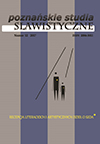“Abandoned Secrets”. The Question of the Holocaust Narratives in Ukrainian Literature
“Abandoned Secrets”. The Question of the Holocaust Narratives in Ukrainian Literature
Author(s): Anja GolebiowskiSubject(s): Jewish studies, Ukrainian Literature, Fascism, Nazism and WW II, History of the Holocaust, Politics of History/Memory
Published by: Uniwersytet Adama Mickiewicza
Keywords: Holocaust; Ukraine; Soviet Union; Jews; Vasilij Grossman; Babyn Jar; collective memory; Mykola Rjabčuk; Maria Matios; Jurij Vynnyčuk; Oksana Zabužko;
Summary/Abstract: Golebiowski Anja, „Abandoned Secrets”. The Question of the Holocaust Narratives in Ukrainian Literature. “Poznańskie Studia Slawistyczne” 12. Poznań 2017. Publishing House of the Poznań Society for the Advancement of the Arts and Sciences, pp. 93–105. ISSN 2084-3011. The reportage Ukraine without Jews (1943) by the Soviet writer Vasilij Grossman is one of the earliest public reports on the Holocaust. Although Ukraine had been in the centre of the Nazi mass murder and single voices like the ones of Grossman or Il’ja Ėrenburg even called betimes attention to the ongoing genocide of Ukrainian Jews, any tradition of Ukrainian Holocaust narratives has not been developed yet. Since its independency in 1991, there are attempts to participate in the Western memory discourse, but by now, they have rather no broader impact. The reception of the debate on the Holocaust serves more likely as a backdrop for its own discourse of victimization, the Holodomor, which is used for developing a national identification within the current Ukrainian nation-building process. Since the Orange Revolution, as the Ukraine has found itself in a critical phase of a socio-political upheaval, some texts of leading Ukrainian writers (Marija Matios, Oksana Zabužko, Jurij Vynnyčuk) have occurred that carefully raise the subject of the Holocaust, or rather the gap in the Ukrainian consciousness. This paper gives an overview about the texts and works out the narrative strategies, whereby only the coming years will show, if these texts constitute the beginning of a Ukrainian Holocaust literature.
Journal: Poznańskie Studia Slawistyczne
- Issue Year: 2017
- Issue No: 12
- Page Range: 93-105
- Page Count: 13
- Language: English

